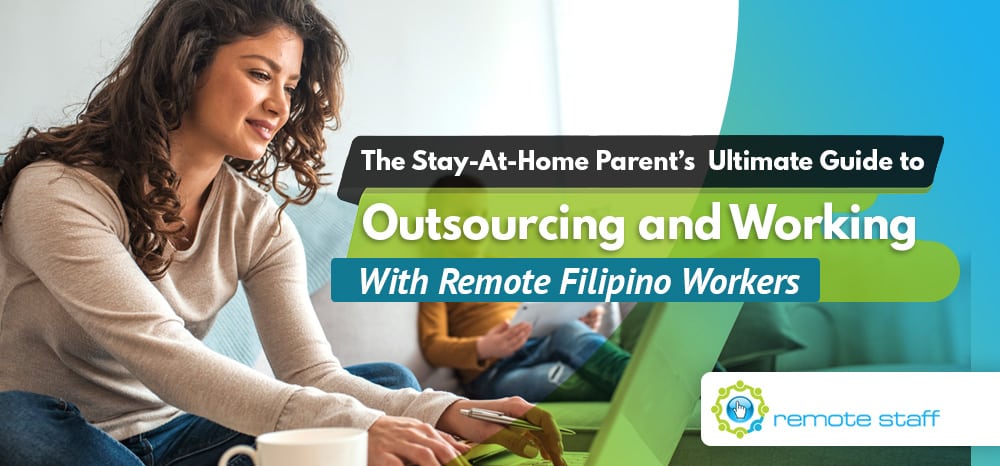Anyone who thinks that Stay-at-Home (SAHM) parents have it easy is clearly mistaken. Yesterday, I read a finance article that says having kids means you’ll retire later as childcare is a full-time job you take on for 18 years.
And yet, that hasn’t stopped many parents from putting up a business on the side. Heck, some of them end up founding mini e-commerce empires!
However, they often don’t accomplish this alone. Just as it takes a village to raise a child, there’s usually a team of people behind every successful SAHM parent. Plot twist: this team generally comes from several villages on an entirely different continent. We’re talking Southeast Asia, specifically the Philippines.
Filipino remote workers have long been the (not-so) secret weapon of many a budding Australian entrepreneur. Why? For starters, they’re some of the most hardworking and talented people on the planet. And if you treat them well, they’ll give you their loyalty.
Secondly, the exchange rate is in your favor. Your Australian dollars would go much further in the Philippines, which means that you can save a significant amount of money on labor costs without compromising your worker’s ability to make a good living.
Lastly, if you do outsourcing right, it’s a less risky way to get your business off the ground. This way, when your company does take off, you can then pay things forward in Oz and hire local counterparts for your remote team.
Still, it’s natural to be hesitant. As with anything else, outsourcing does come with its own risks. Plus, going into it without any kind of strategy all but guarantees failure.
So, as a public service to all the SAHM parents out there (who are already too busy as it is), here’s our ultimate one-stop guide to successfully outsourcing and working with remote Filipino workers:
To Outsource or Not to Outsource?

First things first. Which tasks can you outsource? This criteria ought to be helpful.
If you still have no clue where to begin, here are seven of the most common tasks you can and should outsource now.
Transitioning to an Online Workforce

Covid-19’s made operating online necessary. That’s not so bad for product-based businesses, but it can be a little tricky if you run a service-oriented company. No worries, though. Read this guide for practical solutions to help you make a smooth transition.
If you’re just looking for general strategies, though, you can read this article instead.
Remote Hiring 101

So, you’ve determined which roles you want to outsource. Perhaps you’ve even figured out your strategy for transitioning online. Now, how do you go about hiring your remote talents?
First, decide on whether you want to hire via an agency or from a freelancing website. It may also help for you to read up on why Filipino remote workers in particular are especially cut out for this industry.
Secondly, finalise your criteria and interview questions for the people you’re looking to hire. Here are some very specific guides on how to hire some for the most common remote working positions:
Lastly, here’s how to tell if a certain candidate might not be cut out for remote work. Knowing what to watch out for can spare you a lot of trouble down the line.
Strategies for Successfully Managing Your Remote Team

Congratulations! If you’ve made it this far, you’ve probably already assembled your team and that’s half the battle.
One of the biggest adjustments when it comes to working remotely, especially with Filipino talents, is adapting to differences in culture. Unless you’re well acquainted with such, this article on seven key differences between Western and Filipino work culture is a good place to start. Understanding these can help you manage and get along with your Filipino Remote staff better, making the working experience a lot easier for everyone.
Another challenge is maintaining effective communication despite the distance. Fortunately, there’s all sorts of technology available exactly for this purpose. This handy guide will help you make use of everything from Skype to Trello to Google Docs.
Now, as with any working arrangement, conflicts and concerns between you and your subcontractors can occur. Here at Remote Staff, we have especially designated people and policies in place to resolve any conflicts or concerns that might come up between clients and subcontractors. However, if you haven’t signed up with us yet (tsk, tsk) and are looking for proactive solutions, these two articles may help:
Finally, here’s some useful advice from AU business owners and managers who’ve made outsourcing to Filipino talent work well for them.
SAHM Parenting Hacks

It wouldn’t be a complete guide for SAHM parents without some nifty parenting hacks, would it? Take your pick from the ones below:
-
Eight Online Groceries to Help You Keep Your Fridge Stocked Without Leaving the House
-
Tips for Helping a Child With Special Needs Handle Online Learning
For a truly smooth and hassle-free outsourcing experience, you may want to try signing up with a remote work agency. Remote Staff, for instance, constantly recruits and maintains a rich pool of top Filipino talent and has its own compliance and monitoring software and policies for our clients’ use. Our company even has its own specially-developed training program for onboarding remote workers and clients, as well as dedicated Customer Success staff to personally see to any concerns that might arise.
Remote Staff takes care of all the nitty-gritties of outsourcing so you won’t have to, giving you more energy and time to spend with the people who truly matter: your kids.
Give us a call today.
Serena has been working remotely and writing content for the better part of the last decade. To date, she's written for Pepper.ph and Mabuhay Magazine, among others, and has churned out more than a thousand articles on everything from The Basics of Stock Market Investing to How to Make Milk Tea-Flavored Taho at home. Hermits, aspiring hermits, and non-hermits with interesting project propositions may email her at serena.estrella10@gmail.com.





















